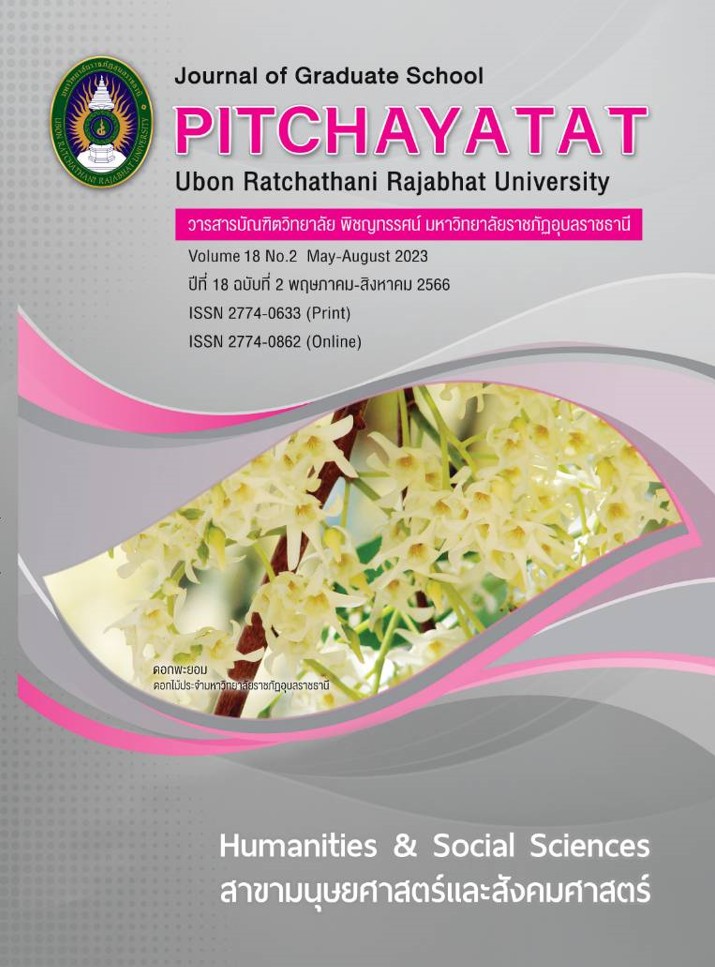การพัฒนาทักษะการอ่านภาษาอังกฤษด้วยนิทานพื้นบ้าน สำหรับนักเรียนชั้นประถมศึกษาปีที่ 5
คำสำคัญ:
ทักษะอ่านภาษาอังกฤษ , นิทานพื้นบ้านบทคัดย่อ
การวิจัยนี้มีวัตถุประสงค์เพื่อ 1) พัฒนาชุดกิจกรรมการพัฒนาทักษะการอ่านภาษาอังกฤษด้วยนิทานพื้นบ้านสำหรับนักเรียนชั้นประถมศึกษาปีที่ 5 และ 2) เพื่อเปรียบเทียบผลสัมฤทธิ์ทางการเรียนของนักเรียนก่อนและหลังเรียนด้วยชุดกิจกรรม ตัวอย่างในการวิจัยคือนักเรียนชั้นประถมศึกษาปีที่ 5 โรงเรียนบ้านจุการ สังกัดสำนักงานเขตพื้นที่การศึกษาอุบลราชธานีเขต 3 ภาคเรียนที่ 1 ปีการศึกษา 2565 จำนวน 40 คน ได้มาโดยการสุ่มแบบกลุ่ม เครื่องมือที่ใช้ ได้แก่ ชุดกิจกรรมการพัฒนาทักษะการอ่านภาษาอังกฤษด้วยนิทานพื้นบ้าน และแบบทดสอบวัดผลสัมฤทธิ์ทางการเรียน สถิติที่ใช้ ได้แก่ ค่าเฉลี่ย ส่วนเบี่ยงเบนมาตรฐาน และการทดสอบที
ผลการวิจัยพบว่า
- ชุดกิจกรรมการพัฒนาทักษะการอ่านภาษาอังกฤษด้วยนิทานพื้นบ้าน สำหรับนักเรียนชั้นประถมศึกษาปีที่ 5 ที่ผู้วิจัยพัฒนาขึ้น มีจำนวน 6 เรื่อง ได้แก่ 1) แม่ย่ากับลูกสะใภ้ 2) ชาวนากับงูเห่า 3) วัวหนุ่มวัวสาว 4) ดาวลูกไก่ 5) ปู่โกหกหลาน 6) ตุ๊กแกกับงูเขียว พบว่ามีค่าเฉลี่ย 4.69 มีระดับความเหมาะสมมากที่สุด มีประสิทธิภาพของกระบวนการ (E1) และประสิทธิภาพของผลลัพธ์ (E2) เท่ากับ 81.85/81.36
2. นักเรียนที่เรียนด้วยชุดกิจกรรมการพัฒนาทักษะอ่านภาษาอังกฤษด้วยนิทานพื้นบ้าน สำหรับนักเรียนชั้นประถมศึกษาปีที่ 5 มีผลสัมฤทธิ์ทางการเรียนหลังเรียนสูงกว่าก่อนเรียนอย่างมีนัยสำคัญทางสถิติที่ระดับ .01
เอกสารอ้างอิง
คันธารัตน์ อยู่สะอาด. “การศึกษาผลของการจัดการเรียนรู้วิชาภาษาอังกฤษโดยใช้นิทานที่มีผลต่อความสามารถในการใช้ภาษาอังกฤษและความคิดสร้างสรรค์ของนักเรียนชั้นประถมศึกษาปีที่ 4,” วารสารวิจัยราชภัฏกรุงเก่า. 3, 3 (มีนาคม 2559): 89-97.
วิชาการ, กรม. หลักสูตรการศึกษาขั้นพื้นฐาน. พิมพ์ครั้งที่ 2. กรุงเทพฯ: องค์การรับส่งสินค้าและพัสดุภัณฑ์, 2544.
วัชราภรณ์ แสงพันธ์. “การพัฒนากิจกรรมการอ่านภาษาอังกฤษเพื่อความเข้าใจโดยใช้นิทานอีสปของนักเรียนชั้นมัธยมศึกษาปีที่ 2,” วารสารศึกษาศาสตร์ ฉบับวิจัยบัณฑิตศึกษา. 4, พิเศษ (เมษายน 2553): 128-135.
รุ่งวนา สุดจิตต์. การพัฒนาสื่อการอ่าน-การเขียนจากนิทานพื้นบ้านไทย สำหรับนักเรียนชั้นมัธยมศึกษาปีที่ 4 โรงเรียนไทรโยคน้อยวิทยาจังหวัดกาญจนบุรี. วิทยานิพนธ์การศึกษามหาบัณฑิต มหาวิทยาลัยศิลปากร, 2545.
ศึกษาธิการ, กระทรวง. คู่มือจัดการเรียนกลุ่มสาระการเรียนรู้ภาษาต่างประเทศ. กรุงเทพฯ: โรงพิมพ์องค์การรับส่งสินค้าและวัสดุภัณฑ์, 2539.
ศุภนิช มั่งมีศรี. การพัฒนาความสามารถด้านการเรียนรู้คำศัพท์ภาษาอังกฤษ โดยใช้นิทานของนักเรียนชั้นประถมศึกษาปีที่ 5. การประชุมวิชาการระดับชาติมหาวิทยาลัยราชภัฏเพชรบูรณ์ ครั้งที่ 4; 10 มีนาคม 2560; เพชรบูรณ์: มหาวิทยาลัยราชภัฏเพชรบูรณ์, 2560.
สุมิตรา อังวัฒนากุล. วิธีสอนภาษาอังกฤษเป็นภาษาต่างประเทศ. กรุงเทพฯ: จุฬาลงกรณ์มหาวิทยาลัย, 2540
สุมณฑา วงษ์สวัสดิ์. การใช้นิทานเป็นสื่อในการเรียนรู้เพื่อพัฒนาความสามารถด้าน การฟังภาษาอังกฤษของนักเรียนชั้นประถมศึกษาปีที่ 5 โรงเรียนประถมนนทรี กรุงเทพมหานคร. วิทยานิพนธ์ศิลปศาสตรมหาบัณฑิต มหาวิทยาลัยศรีนครินทรวิโรฒ, 2552.
Collie, Sarah L. The learning organization and teaching improvement in academic Departments. Doctoral Dissertation Higher Education, University of Virginia, 2002.
ดาวน์โหลด
เผยแพร่แล้ว
รูปแบบการอ้างอิง
ฉบับ
ประเภทบทความ
สัญญาอนุญาต
ลิขสิทธิ์ (c) 2023 วารสารบัณฑิตวิทยาลัย พิชญทรรศน์ มหาวิทยาลัยราชภัฏอุบลราชธานี

อนุญาตภายใต้เงื่อนไข Creative Commons Attribution-NonCommercial-NoDerivatives 4.0 International License.
บทความทุกเรื่องได้รับการตรวจความถูกต้องทางวิชาการโดยผู้ทรงคุณวุฒิภายนอกอย่างน้อย 3 คน ความคิดเห็นในวารสารพิชญทรรศน์เป็นความคิดเห็นของผู้นิพนธ์มิใช่ความคิดเห็นของผู้จัดทำ จึงมิใช่ความรับผิดชอบของวารสารพิชญทรรศน์ และบทความในวารสารพิชญทรรศน์สงวนสิทธิ์ตามกฎหมายไทย การจะนำไปเผยแพร่ต้องได้รับอนุญาตเป็นลายลักษณ์อักษรจากกองบรรณาธิการ





